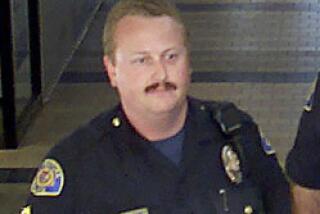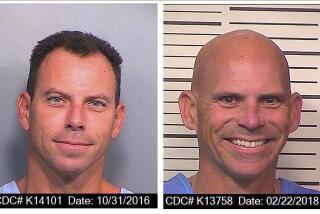Family Tries to Fathom Killings in Fresno
- Share via
FRESNO — The man accused of killing nine of his children and grandchildren in a mass murder involving polygamy and incest grew up in a sheltered world shaped by two hard-working parents and the strict ways of the Seventh-day Adventist Church.
People searching for clues to Marcus Wesson’s alleged crimes need not look at his childhood, his elderly mother said Thursday.
“The Marcus Wesson on TV I don’t recognize. That’s not my son,” Carrie Wesson told The Times from her home in Washington state. “The Marcus Wesson I raised was a brilliant, loving, God-fearing child.”
One week after the worst mass murder in Fresno’s history, as the image of the stout man with a face full of bushy hair and dreadlocks to his knees found its way across the globe, members of his family tried to fathom what forces might have pushed him over the edge.
His mother said he had called her two days before last Friday’s killings to inquire about his father, who is fighting cancer. He sounded upbeat, she recalled, saying he was hard at work converting another school bus into a gleaming motor home so his younger children could see the country.
“He was so concerned about his father. He ended every conversation with ‘I love you, Dad. I love you, Mom.’ He never forgot our birthdays. Never forgot Mother’s Day. And he felt the same way about those kids.
“To make him do this, there must have been some big trauma. Something that pushed him over,” she said. “This is a Christian family. This is not a cult.”
Relatives said they remained baffled over a possible motive. Wesson never told them he felt cornered, that he was facing eviction from yet another house or that the estranged mothers of his young children were demanding custody.
“If Marcus is guilty, I would really feel disappointed in my country if it didn’t make him face the penalty,” his mother said. “But I’m a biblical person too, and I don’t believe in capital punishment.
“What I would like for Marcus to do is sit in prison and think about what he’s done and read the Bible. I think he will come back. Spiritually he will come back. Because I want to see my son in heaven someday,” she said, sobbing.
Members of his family recalled the boy born in Kansas who could put together intricate puzzles that confounded adults, who constructed go-carts and electric cars out of parts picked up at flea markets and passed on this love of building to his children.
“My dad wanted his children to make something out of nothing,” said his oldest son, Dorian Wesson, 29. “If I wanted a toy, he’d buy the wood and supplies and tell me to use my imagination and create what I wanted.
“He didn’t trust the outside world. Public schools, kids taking drugs, gangbanging, computers and TV. That was considered corrupt. He wanted something better for us. I grew up feeling free.”
Marcus Wesson lived an odd life, they acknowledged, fathering two sets of children -- 16 altogether -- in different parts of California. There was Dorian and an older group of sons and daughters who ranged in age from 17 to 29 and were raised by one mother. They grew up following their father as he moved from one renovation project to another, houses in San Jose, Santa Cruz and Fresno and boats in Marin County.
And there was a second group of children ages 8 and younger who were born to different mothers and lived with Wesson in a small house in a working-class neighborhood of central Fresno. Those children are now all dead.
His mother and oldest son said they were never aware that Wesson had a sexual relationship with two of his own daughters and that two of the deceased children were products of incest.
“I thought it was strange that my sisters had these babies and they never said who the fathers were,” Dorian Wesson recalled. “They told me the kids came from artificial insemination, and I believed them.”
As perverse as the family dynamic became, they said, Wesson held on to some of the core values he grew up with. He loved his children and tried to safeguard them from the more negatives aspects of American culture. Despite media speculation, they said, he wasn’t a member of any fringe sect.
“Our family is a good family,” Carrie Wesson said. “This is a Christian family. This is not a cult.”
From the earliest age, she said, her son exhibited a nimble mind for building things and a big heart for rescuing animals. He was their first child -- an earlier pregnancy ended in a still birth -- and she and her husband, Benjamin Franklin Wesson, doted on him. They had a tall stack of gospel records, and she’d tell him she wanted to hear one song in particular and he knew exactly where to find it.
“He was only 2 years old and I’d say I’m in the mood to hear ‘I Don’t Possess Houses of Gold,’ and that little Marcus would hunt through those albums in nothing flat and put it on the old-fashioned turntable.”
He cared for lizards, snakes and toads and once found a dog left for dead in a trash can. “I told him, ‘That dog’s dead,’ but he wouldn’t believe me. ‘Momma, I can hear a faint heartbeat.’ He fed it milk all day and night and brought it back to life.”
After the family left Kansas and moved to the San Jose area, they remained devoted members of the Seventh-day Adventist Church. They worshiped on Saturdays, didn’t attend dances, dressed modestly and kept to a vegetarian diet.
“His entertainment was the church. He wasn’t running around seeing what little girl he could catch,” his mother said. “Instead, he’d be at the table eating food, always stuffing his face. That’s why he got that big.”
She said he grew up in a solid middle-class home with a father who had a steady job, though she declined to say what it was. “I want to keep our privacy as much as possible,” she explained. In his teenage years, her son began to build all sorts of motorized vehicles out of shopping carts and scrap metal. One caught the eye of an engineering professor at Stanford, she said.
“I know I’m bragging, but this professor asked Marcus where he got his training to build it. Marcus told him he didn’t have any degrees, no formal education beyond high school. He told him, ‘It’s a gift from God.’ ”
During the Vietnam War, Wesson was stationed in Germany and came home with a different political outlook, she said.
“We always liked nice things, nice furniture, but Marcus said we were too materialistic. He got married and kind of dropped out,” she recalled. “I wouldn’t say he became a hippie, but he had some of that hippie lifestyle.”
Wesson met Elizabeth Solorio in San Jose and married her when she was 15. They had five boys -- Dorian, Adrian, Almae, Marcus and Serafino -- and four girls -- Sebhrenah, Kiani, Gypsy and Elizabeth. Wesson has been charged with fatally shooting both Sebhrenah, 25, and Elizabeth, 17.
“Dad home-schooled us,” Dorian said. “He taught us algebra and trigonometry. We kept to the Seventh-day Adventist teachings, but we didn’t go to church as often.”
They lived in a modest house his father built in the Santa Cruz Mountains and then sold the house for three acres nearby. “We flip-flopped from San Jose to Santa Cruz to Fresno when I was 10. And then we moved back to Santa Cruz.”
Carrie Wesson recalls her son buying a bus and renovating it into a motor home. “It was a piece of junk when he bought it,” she said, “and he turned it into something beautiful. It had a shower, beds and a laundry room with a chute for dirty clothes.”
In 1998, Wesson and wife Elizabeth returned to Fresno, while Dorian and several of the older siblings found jobs and stayed on the coast. It was about this time that Wesson began living with several women -- women related to each other -- and having more children.
The women worked as hotel clerks and restaurant waitresses. Wesson had enough money to indulge his passion for expensive antique and reproduction furniture. He was a frequent visitor to Dugovic’s antique store in Fresno, where 11 hand-carved coffins from Indonesia caught his eye in the late 1990s. He bought the coffins for about $5,000 with the idea of using their mahogany on one the boats he still owned in Marin County, said owner Lois Dugovic.
Wesson put a lot of dreams into a historic home in the middle of Fresno that had been gutted by fire, his family said. He and the women put a down payment on the house and began renovating it. He built an elaborate roof and did the framing by himself, but he ran out of money and defaulted on the loan.
They moved into the house on West Hammond, and he and the women began spending more time renovating a new bus -- this one with bright yellow paint, gleaming chrome sides and even a spa in the back. It was halfway done when the killings stopped everything.
Wesson had kept the coffins, stacked in the living room, as part of a plan to move back to the coast and fix up the boats, family members say.
“He told me, ‘Momma, you won’t believe it. I’m back into another bus. This one’s going to be as nice as the last one,’ ” his mother said. “He sounded good. He was a beautiful and caring man. Some big trauma. Something big pushed him over.”
More to Read
Sign up for Essential California
The most important California stories and recommendations in your inbox every morning.
You may occasionally receive promotional content from the Los Angeles Times.













